
Ocean Systems Engineering-An International Journal
Scope & Guideline
Driving Progress in Automotive and Ocean Engineering Research
Introduction
Aims and Scopes
- Hydrodynamic Analysis and Modeling:
The journal emphasizes the development and application of hydrodynamic models to understand fluid interactions with marine structures, including floating platforms, offshore wind turbines, and wave energy converters. - Structural Integrity and Fatigue Analysis:
There is a strong focus on the assessment of structural integrity in offshore installations, particularly concerning fatigue analysis and stress concentration in various joint configurations. - Renewable Energy Technologies:
Research on the optimization and performance assessment of renewable energy systems, particularly wind and wave energy technologies, is a significant focus area, reflecting the journal's commitment to sustainable energy solutions. - Numerical Simulations and Experimental Studies:
The journal publishes both numerical simulations and experimental investigations, providing a comprehensive understanding of ocean systems through a combination of theoretical and practical research. - Environmental Impact Assessments:
Research on the environmental implications of marine engineering projects, including sediment transport and ecological impacts, is an essential part of the journal's scope.
Trending and Emerging
- Floating Offshore Wind Energy Systems:
There is a notable increase in research focused on floating wind energy platforms, highlighting their potential for harnessing renewable energy in deeper waters where traditional fixed structures are impractical. - Wave Energy Conversion Technologies:
Emerging studies on wave energy converters demonstrate a growing interest in optimizing designs for efficiency and integration into existing power grids, showcasing advancements in renewable energy technologies. - Artificial Intelligence in Marine Engineering:
The application of machine learning and AI-based approaches for predictive modeling and optimization in marine environments is on the rise, indicating a shift towards data-driven decision-making in ocean engineering. - Environmental Sustainability and Resilience:
Research addressing the environmental impacts of marine engineering projects, including assessments of sediment transport and ecological interactions, is increasingly prevalent, emphasizing the industry's focus on sustainable practices. - Advanced Numerical Methods and Simulations:
The adoption of sophisticated numerical modeling techniques, such as computational fluid dynamics (CFD) and smoothed particle hydrodynamics (SPH), is trending, reflecting the need for high-fidelity simulations in complex marine environments.
Declining or Waning
- Traditional Marine Structures:
Research focused on conventional marine structures, such as fixed platforms and older vessel designs, appears to be decreasing, possibly due to the industry's shift towards more innovative and adaptable solutions like floating structures. - Basic Hydrodynamics without Advanced Applications:
Studies that only address fundamental hydrodynamic principles without application to modern engineering challenges are becoming less common, as researchers prioritize applied studies that contribute directly to technology development. - Historical Case Studies:
The frequency of historical case studies analyzing past marine engineering projects has diminished, as contemporary research increasingly emphasizes forward-looking, innovative designs and technologies. - Static Analysis Techniques:
Static analysis of marine structures is becoming less emphasized as dynamic analysis and real-time modeling techniques gain traction, reflecting the industry's need for more responsive and adaptable engineering solutions.
Similar Journals
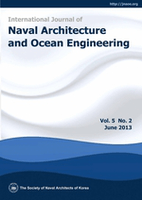
International Journal of Naval Architecture and Ocean Engineering
Connecting researchers to the future of ocean engineering.International Journal of Naval Architecture and Ocean Engineering is a premier academic journal dedicated to advancing the fields of naval architecture and ocean engineering. Published by the SOC NAVAL ARCHITECTS KOREA, this Open Access journal has been a vital resource for researchers and industry professionals since its founding in 2009, providing unrestricted access to high-quality, peer-reviewed articles. With a notable Q2 ranking in both Control and Systems Engineering and Ocean Engineering, it ranks among the top journals in its category, offering valuable insights into emerging technologies and methodologies. The journal’s reputation is further highlighted by its Scopus rankings, positioning it within the top 30% of journals in Ocean Engineering and the top 31% in Control and Systems Engineering as of 2023. Based in the vibrant academic hub of Seoul, South Korea, the journal invites manuscripts that explore innovative solutions and critical research to address the challenges in naval and oceanic environments, contributing to the global dialogue on sustainable maritime practices.

INTERNATIONAL JOURNAL OF OFFSHORE AND POLAR ENGINEERING
Pioneering Research for Harsh EnvironmentsINTERNATIONAL JOURNAL OF OFFSHORE AND POLAR ENGINEERING, published by the International Society of Offshore and Polar Engineers, is a prominent academic journal dedicated to advancing research in key engineering disciplines such as Civil, Mechanical, and Ocean Engineering. Established in 1991, the journal caters to a global audience, providing an essential platform for disseminating innovative findings and case studies pertinent to offshore and polar environments. With a focus on practical and theoretical applications, the journal ranks in the Q3 category across its relevant fields as of 2023, reflecting its significant contribution to civil and structural engineering, mechanical engineering, and ocean engineering. Although it does not offer open access, its rigorous peer-review process ensures that only high-quality research is published, making it a critical resource for researchers, industry professionals, and students invested in the dynamics of offshore and polar engineering. The journal's commitment to exploring emerging challenges and technological advancements underlines its importance in shaping the future of engineering practices in some of the world's most extreme environments.
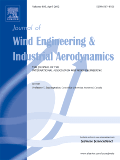
JOURNAL OF WIND ENGINEERING AND INDUSTRIAL AERODYNAMICS
Innovating Solutions for a Sustainable Wind-Focused FutureJOURNAL OF WIND ENGINEERING AND INDUSTRIAL AERODYNAMICS, published by ELSEVIER, stands as a premier platform for innovative research in the fields of wind engineering and industrial aerodynamics. With a rich publication history dating back to 1975 and continuing through its converged years until 2024, this journal emphasizes the importance of understanding wind effects on various structures and systems, highlighting its relevance in today's rapidly evolving engineering landscape. It boasts impressive Q1 rankings across multiple categories including Civil and Structural Engineering, Mechanical Engineering, and Renewable Energy, Sustainability and the Environment, reflecting its high-impact contributions to these vital areas of study. Furthermore, the journal is recognized for its rigorous peer-review process and scholarly excellence, making it an essential resource for researchers, professionals, and students alike seeking to deepen their knowledge and drive innovations in the field. While it does not offer open access options, readers can engage with its comprehensive analyses and findings through institutional subscriptions or individual purchases to stay informed about the latest advancements.
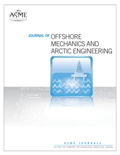
JOURNAL OF OFFSHORE MECHANICS AND ARCTIC ENGINEERING-TRANSACTIONS OF THE ASME
Bridging theory and practice in offshore mechanics.JOURNAL OF OFFSHORE MECHANICS AND ARCTIC ENGINEERING-TRANSACTIONS OF THE ASME (ISSN: 0892-7219; E-ISSN: 1528-896X) is a premier publication by the American Society of Mechanical Engineers (ASME), dedicated to advancing the field of offshore mechanics and Arctic engineering. Established in 1987 and running through 2025, this journal provides a crucial platform for researchers and practitioners to disseminate their findings in a rapidly evolving sector faced with unique challenges related to energy, ocean engineering, and mechanical engineering. With a notable impact reflected in its Scopus ranks—#224 in Mechanical Engineering and #39 in Ocean Engineering—the journal holds a significant position in the academic community, publishing high-quality peer-reviewed articles that span innovative technologies, safety, and environmental considerations in offshore and Arctic contexts. While currently not adopting an Open Access model, its strategic focus and rigorous standards make it an essential resource for students, professionals, and researchers passionate about expanding knowledge in these critical engineering domains.

Advances in Energy Research
Catalyzing Change through Cutting-edge Energy Research.Advances in Energy Research is a prominent journal dedicated to the exploration and advancement of energy technologies and sustainable practices. Published by TECHNO-PRESS, this journal serves as a vital platform for researchers, professionals, and students in the energy field, featuring innovative studies and reviews that contribute to the body of knowledge surrounding energy efficiency, renewable resources, and the integration of new technologies. The journal holds a significant position in energy research and aims to facilitate the dissemination of groundbreaking findings and ideas that are pivotal for the transition toward a more sustainable energy future. Located in South Korea, with an ISSN of 2287-6316, it embraces an open access philosophy that ensures widespread availability of its content, further enhancing its impact in the academic community.
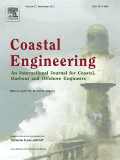
COASTAL ENGINEERING
Advancing Coastal Solutions for a Sustainable FutureCOASTAL ENGINEERING is a prestigious journal published by Elsevier, focusing on the multidisciplinary fields of coastal and ocean engineering. With its ISSN 0378-3839 and E-ISSN 1872-7379, this journal has established a reputation for contributing high-quality research that addresses the dynamic challenges faced in coastal environments. Notably, it holds a remarkable Q1 ranking in both Environmental Engineering and Ocean Engineering categories, placing it in the top tier of academic journals with an impressive Scopus rank of #6 among 105 in Ocean Engineering and #28 among 197 in Environmental Science. The journal spans from its inception in 1973 to the present, with valuable insights that shape future developments in coastal management, sustainability, and engineering practices. Although it does not currently offer an Open Access option, its impact on advancing knowledge in the field is significant, making COASTAL ENGINEERING an essential resource for researchers, professionals, and students devoted to the preservation and enhancement of coastal and marine environments.
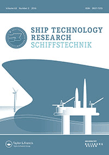
Ship Technology Research
Pioneering solutions for modern maritime challenges.Ship Technology Research, published by Taylor & Francis Ltd, is a premier journal dedicated to advancing the field of ocean engineering. Established in 1995, this journal provides a critical platform for cutting-edge research, innovative methodologies, and the latest developments in ship technology. With a notable Q2 ranking in the Ocean Engineering category for 2023 and placing in the 70th percentile of Scopus rankings, the journal serves as an essential resource for professionals, researchers, and students aiming to enhance their knowledge and contribute to maritime advancements. The journal not only disseminates high-quality research but also encourages collaboration across disciplines, addressing the real-world challenges faced in ship design, operation, and technology. As a non-open access journal, it continues to uphold rigorous standards, ensuring that published work is both relevant and impactful in fostering innovation in the maritime industry.
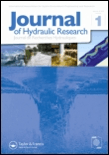
JOURNAL OF HYDRAULIC RESEARCH
Connecting Scholars to the Future of Hydraulic InnovationJOURNAL OF HYDRAULIC RESEARCH, published by TAYLOR & FRANCIS LTD, serves as a leading platform for the dissemination of groundbreaking research in the fields of civil and structural engineering as well as water science and technology. With its inception in 1963 and a focus that spans to 2024, the journal holds a notable reputation, categorized in the Q2 quartile in both engineering and environmental sciences, indicating its significant impact on contemporary research. It is indexed under ISSN 0022-1686 and E-ISSN 1814-2079, allowing for a comprehensive reach to professionals and scholars worldwide. The journal regularly features high-quality articles, fostering an academic community dedicated to innovative hydraulic research, sustainable water management, and engineering advancements. Researchers and practitioners benefit from the rigorous peer-review process that ensures the highest standards of scholarly excellence in every published work. As part of its commitment to knowledge dissemination, JOURNAL OF HYDRAULIC RESEARCH remains an essential resource for anyone engaged in the dynamic interplay of water and engineering sciences.
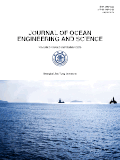
Journal of Ocean Engineering and Science
Elevating ocean engineering to new horizons.The Journal of Ocean Engineering and Science, published by Elsevier, is a prominent academic journal dedicated to advancing the field of ocean engineering and environmental sciences. Since its inception as an Open Access journal in 2016, it has rapidly gained recognition, achieving significant impact factor ratings with notable placements in the prestigious Q1 category for Ocean Engineering and Oceanography, and Q2 for Environmental Engineering in 2023. With a remarkable ranking of #3 out of 105 in Ocean Engineering and #4 out of 145 in Oceanography according to Scopus, the journal plays a critical role in disseminating cutting-edge research and innovative solutions addressing complex challenges faced by marine environments. Operating from Amsterdam, Netherlands, the Journal of Ocean Engineering and Science invites contributions from researchers, professionals, and students worldwide, emphasizing the importance of interdisciplinary approaches in achieving sustainable maritime practices.

International Journal of Engineering Research in Africa
Fostering Knowledge, Driving ProgressThe International Journal of Engineering Research in Africa is a pivotal academic resource for researchers, professionals, and students interested in the multifaceted field of engineering within the African context. Published by TRANS TECH PUBLICATIONS LTD, this journal facilitates the dissemination of innovative research, covering a myriad of topics in engineering, from advanced materials to sustainable practices. With an ISSN of 1663-3571 and E-ISSN 1663-4144, this publication not only fosters scholarly communication but also contributes to the global engineering discourse, as evidenced by its current Q3 ranking in the Engineering (miscellaneous) category in 2023. Operating from its base in Switzerland, the journal has been actively publishing since 2010 and continues to play a vital role in the advancement of engineering knowledge, particularly in the African landscape. Although it does not offer an open access model, the journal's commitment to quality research ensures that it remains a valuable asset for those seeking to understand and innovate within the engineering sector. Its integration in Scopus with a rank of #175 out of 307 in General Engineering further underscores its relevance and impact in the engineering community.